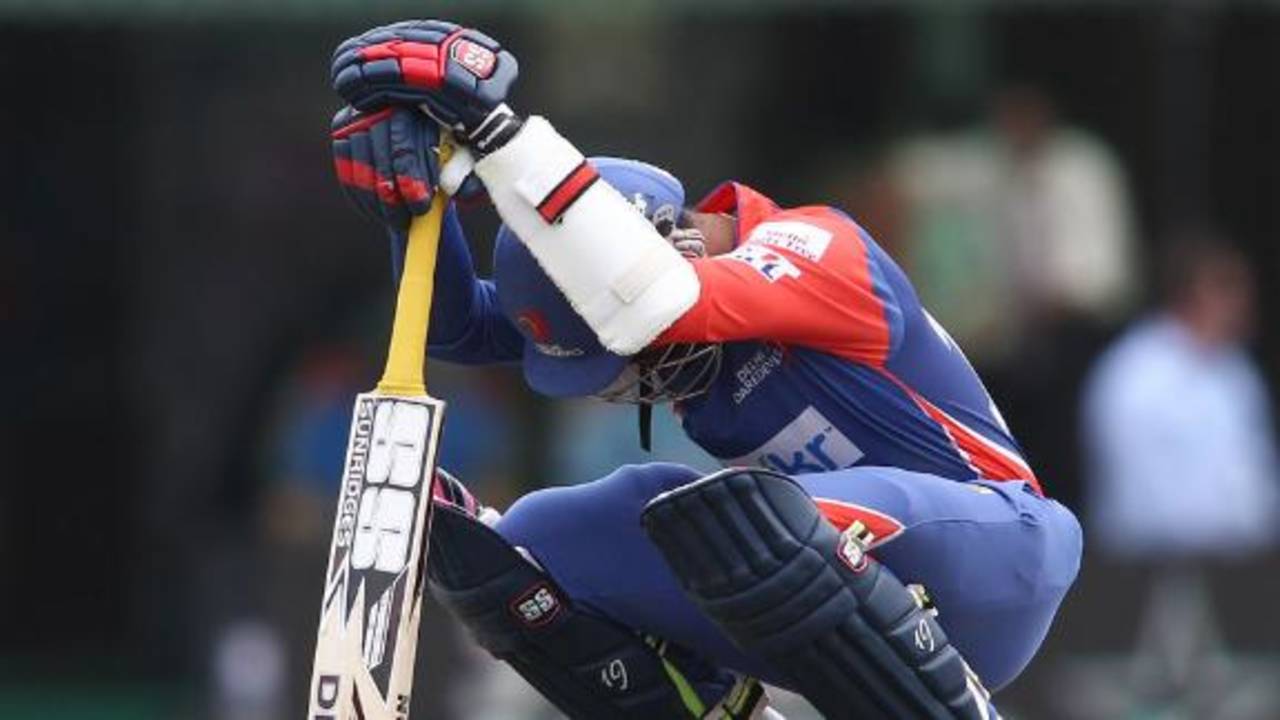The revamp that changed nothing
After last year's drubbing, Delhi Daredevils opted for wholesale changes this season. It made little difference, though, as they floundered in every department and finished bottom of the table again
Rachna Shetty
May 26, 2014, 7:42 AM

Kevin Pietersen's batting and captaincy were not up to scratch•BCCI
Where they finished
Last, with two wins in 14 games.
What went right
Little went right for Delhi Daredevils this season. After their last-place finish in IPL 2013, they began 2014 on a shaky note. Their loss in the opening game to Royal Challengers Bangalore was their seventh successive one, but they picked up the pieces in the next match against Kolkata Knight Riders, winning by four wickets. Three matches later, they restricted Mumbai Indians to 125 for 6, their best bowling performance of the season, and went on to win by six wickets. That, however, would be their last win in IPL 2014 before another losing streak of nine matches - their third extended string of losses over the past two seasons and their worst in the IPL.
What went wrong
After last year's drubbing, where they finished in ninth place, change was the buzzword for Daredevils. They brought in Gary Kirsten as coach. They opted to not retain any of their players ahead of the auction, the only franchise to do so. Along with Royal Challengers Bangalore, they also spent their entire budget.
After the auction, the one thing that stood out about the Daredevils squad was how heavily batting-centric it was. James Neesham and Laxmi Shukla were their slotted allrounders but neither played a season entirely. Packing the side with batsmen also meant they could never quite hit on a combination that put batsmen in best-suited slots. Ross Taylor, for instance, is primarily a top-order batsman even in T20s but was played at No. 6 in three of the four games he played this season. JP Duminy and Kedar Jadhav were slotted in as finishers and batted low down despite being their best batsmen; Daredevils suffered as their best batsmen were denied significant batting time at the crease. It didn't help that opener M Vijay - who was picked up by Daredevils after being a regular performer for Chennai Super Kings over the seasons - was in woeful touch.
Their bowling was left considerably weakened by injuries, lack of form and the absence of a plan B. Nathan Coulter-Nile's departure due to injury left Daredevils' pace attack reliant on Wayne Parnell and Mohammed Shami and both couldn't step up. Their Indian pacers, Jaydev Unadkat and Rahul Shukla, had mediocre seasons. An average of 3.6 wickets per match is hardly the sign of a winning team. Near the end of the season, Eric Simons, the franchise's fast-bowling coach, admitted he had been using mats to train his bowlers to bowl to appropriate lengths - which they consistently missed.
The spinners didn't fare any better, evidenced from the fact that midway through the tournament, Duminy, a part-timer, was the best spinner. Shahbaz Nadeem flopped and Rahul Sharma was given just two games. Imran Tahir's late addition to the side barely made a ripple, in spite of his form in the World T20 that preceded the IPL.
Key stat
Delhi Daredevils were the worst bowling team of the tournament. They took the fewest wickets (51) at the worst average (41.47) at the highest strike rate (29.40) and had the most expensive economy rate (8.44). They did not bowl a single maiden over, and none of their bowlers claimed a four-wicket haul.
Best player
Undoubtedly, JP Duminy. Their only batsman to feature among the top 10 run-getters, he repeatedly had to step in either to stem a collapse or score quick runs when the side was almost out of time. In spite of that, he finished the season with 410 runs at an average of 51.25. Also, Duminy was the most economical of Daredevils' bowlers (apart from Coulter-Nile who exited early in the campaign), bowling his part-time offspinners in 11 games out of 14.
Poor performer
When you spend a third of your auction budget on two batsmen, high expectations are a part of the package. Unfortunately for Daredevils, Kevin Pietersen and Dinesh Karthik did not have much of an impact at all. While Karthik managed three fifties, he couldn't reproduce the consistency he showed for Mumbai Indians in the league stages of IPL 2013. Pietersen, playing in his first tournament as a free agent, missed a few games at the start due to injury and found semblance of form only towards the very end of the tournament when it was too late. His captaincy also left a lot to be desired.
Surprise package
Until 2014, Kedar Jadhav had had indifferent seasons with Delhi Daredevils in the IPL, including one last year where he scored 152 runs in 12 innings. This season, lifted by his form that helped him score six hundreds in the Ranji Trophy, Jadhav quickly settled into the niche of a finisher. In 10 innings, he scored 149 runs which came at a brisk strike rate of 147.52, the best among Daredevils' batsmen.
Memorable moment
One of the more forgettable aspects of IPL 2014 for Kevin Pietersen was his running between the wickets. In both matches against Rajasthan Royals, Pietersen escaped being run-out. In the first instance, the umpire Sanjay Hazare, shot down an appeal from Royals, a decision for which he was later stood down from the IPL. In the second game, Pietersen's bat was stuck in the turf and his foot was in the air when the ball hit the stumps. Royals, however, did not appeal for the run-out. The image of Daredevils' struggles was best captured, perhaps, by Manoj Tiwary's run-out against Kings XI Punjab in their last league game.
Unused players
Milind Kumar, HS Sharath and Jayant Yadav. Saurabh Tiwary was ruled out after the UAE leg due to a shoulder injury.
Rachna Shetty is a senior sub-editor at ESPNcricinfo
